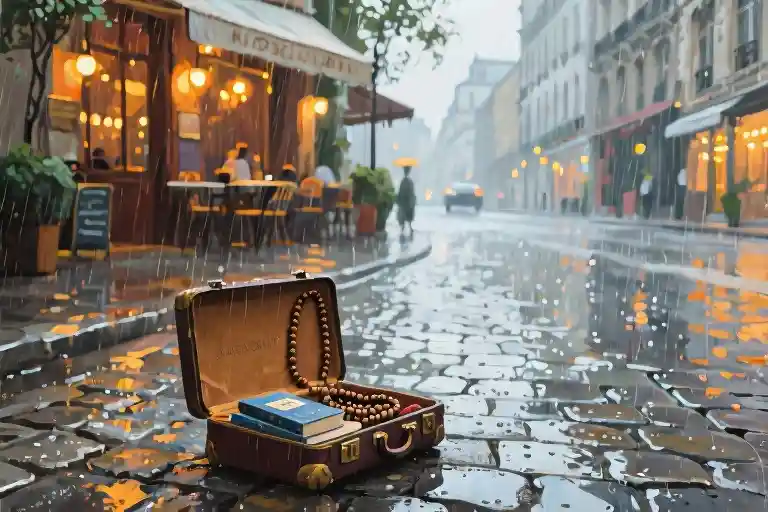The rain fell in steady sheets as I dragged two oversized suitcases through nearly empty Parisian streets that first Saturday morning. My mother walked beside me, her question hanging in the damp air between us: “Do you like it?”
“Yes,” I replied automatically at seventeen, the weight of my dreams pressing heavier than the luggage in my hands. This was my grand adventure beginning – studying law at La Sorbonne, possibly pursuing a double degree, becoming the sophisticated European citizen I’d imagined. I’d prepared meticulously: perfect grades, researched neighborhoods, even practiced basic French phrases.
Yet as my sneakers splashed through puddles forming along the cobblestones, I couldn’t name the peculiar hollow feeling beneath my ribs. It would take seven years and countless rainy days to understand what no pre-departure checklist could capture: the invisible curriculum of living abroad that rewrites you from the inside out.
Cultural adaptation begins long before you unpack your suitcase. That first walk through Paris taught me how expectations shimmer like rain-slicked pavement – beautiful from a distance, but slippery when you try to stand on them. The cafés appeared exactly as pictured in films, yet no guidebook mentioned how the aroma of fresh croissants would suddenly sharpen your loneliness when you had no one to share them with.
International student experiences often get polished into inspirational highlight reels. We see the Eiffel Tower selfies, not the 3AM struggles with online tax portals. We hear about language breakthroughs, not the stomach-dropping moment when you realize your “fluent” French evaporates during bureaucratic interviews. Moving abroad strips away your familiar reference points until you’re left with the most uncomfortable companion – your unvarnished self.
What makes cultural adjustment so disorienting isn’t the obvious differences, but the thousand invisible assumptions you never knew you carried until they clashed with local norms. My Greek upbringing taught me that interrupting conversations showed enthusiastic engagement; my French classmates perceived it as barbaric rudeness. Back home, we joked that Mediterranean families could hear olive oil splattering three villages over, while Parisian neighbors would leave passive-aggressive notes about “excessive laughter” after 8PM.
These weren’t mere lifestyle preferences, but tectonic plates of identity grinding against each other. With each cultural faux pas, I felt pieces of myself breaking off – the loud, tactile, perpetually late version of me that never fit neatly into French social codes. Yet returning to Greece eventually felt equally foreign, my hybrid manners drawing comments about becoming “too cold” or “not Greek enough.”
The greatest myth about studying abroad? That it’s a temporary experience with a clear endpoint. In truth, you don’t just acquire a degree or language skills – you become a cultural shapeshifter, fluent in multiple ways of being but never completely belonging to any. This metamorphosis happens incrementally, like rainwater eroding stone:
- The morning you instinctively lower your voice on the metro without thinking
- The holiday visit when your family’s chaotic dinner table suddenly feels overwhelming
- The surreal moment you catch yourself criticizing both cultures with equal detachment
My rain-soaked arrival contained all these future realizations in embryonic form. When my mother asked if I liked Paris, I couldn’t yet articulate that I was standing at the threshold of becoming someone new – someone who would eventually sing in the rain not from naivety, but from hard-won resilience. The journey from that first “yes” to genuine contentment would require weathering storms no pre-departure brochure ever mentions.
From Being Cared For to Handling It All: The Survival Guide No One Gives You
The first time my kitchen sink clogged at 2 AM in my Paris studio, staring at the rising water while frantically Googling “plumber emergency French” with one hand and clutching a bucket with the other, it hit me: adulthood abroad isn’t about cafés by the Seine. It’s about becoming the person who unclogs sinks.
The Administrative Gauntlet
Nothing prepares you for the bureaucratic ballet of settling abroad. My initiation came when applying for CAF (Caisse d’Allocations Familiales), France’s housing subsidy. After three visits to different offices with conflicting document requirements (pro tip: always get copies stamped), I learned these survival tactics:
- The Golden Trio of Websites:
- service-public.fr (all government procedures)
- ameli.fr (health insurance)
- impots.gouv.fr (taxes)
Bookmark these with Google Translate extension enabled.
- Document Dossier: Maintain physical/cloud copies of:
- Passport + visa
- Rental contract
- School enrollment proof
- French bank RIB (account details)
Domestic Domination 101
That moment when you realize “home” now means being responsible for:
- The Great Appliance Uprising: French washing machines often lack dryers. My first laundromat experience involved shrinking all my sweaters to doll-size. Lesson learned: cold wash, air dry.
- Emergency Contacts Cheat Sheet:
Situation Number Notes
Plumbing 01 40 29 00 00 (Paris emergency plumbers) Say “fuite d’eau” (water leak)
Electricity 09 72 67 50 XX (last digits vary by arrondissement) Have contract number ready
Locked out Your landlord’s number Better get this before needing it Time Management for the Suddenly Solo Greek families operate on “we’ll eat when everyone’s home” time. France runs on precision. My adapted weekly schedule:Monday: - 18:00 Groceries (markets close early Tue) - 19:30 Laundry (avoid Sunday when laundromats close) Wednesday: - 13:00 Post office run (least crowded lunch hour) - 15:00 Administrative emails (French offices respond 2-4 PM)The Loneliness Paradox That eerie silence when you realize no one will ask if you’ve eaten. Combat strategies:- Sensory Anchors: Play Greek radio (ERT Echo) while cooking familiar recipes
- Routine Touchpoints: Become a “regular” at a boulangerie – the “bonjour, Madame” exchanges build micro-connections
- Solo Adventures: Treat yourself to weekly museum visits (under-26 EU residents get free Louvre access)
- Number of kisses: Ranges from 2 (Paris) to 4 (Provence)
- Cheek approach angle: 30 degrees to avoid nose collisions
- Sound effects: Optional air kiss noises (overdoing this marks you as trying too hard)
- Bread protocol: Tearing baguettes vs. slicing (French horror: watching me butcher bread with a knife)
- Queue psychology: The British invented orderly lines; Greeks perfected creative clustering; the French developed an artful blend of both
- Personal space: That empty seat next to you on the bus? In Greece it’s an invitation for conversation; in France it’s a sacred buffer zone
- “Sorry for my Greek-level excitement – we applaud when the check arrives!”
- “In my culture we feed people to show love – hence the three desserts I brought.”
- Forgetting which version of yourself to present at international mixers
- Developing an internal censor that constantly asks “Is this appropriate here?”
- Feeling like a cultural chameleon without a default color
- Social Energy: My Greek self craves spontaneous gatherings; my French self guards personal time fiercely
- Communication: Directness feels rude in Athens but necessary in Parisian workplaces
- Time Perception: Arriving “fashionably late” became a stressful calculation rather than instinct
- Cultural Bridge Building: Spotting unspoken tensions in multicultural teams
- Adaptive Thinking: Switching communication modes like linguistic gears
- Critical Perspective: Seeing each culture’s blind spots clearly
- Created a “cultural strengths” journal noting when my mixed background proved advantageous
- Sought out other “cultural hybrids” through expat communities
- Stopped apologizing for not fitting neatly into either box
- Nuanced Understanding: Recognizing why French bureaucracy values procedure while Greek systems prioritize personal connections
- Creative Problem-Solving: Blending Mediterranean flexibility with Gallic structure in my legal work
- Empathy Expansion: Spotting the loneliness in both the reserved Parisian and the boisterous Athenian
- Academic performance: My lecture notes from November to February looked like they’d been taken by three different people – the neat, organized September version of me gradually giving way to scribbled pages with coffee rings
- Social habits: That natural Greek tendency to stay out until 2am chatting in cafés? Replaced by an urgent need to hibernate by 8pm
- Basic functioning: Some mornings, simply putting on matching socks felt like a major achievement
- Cultural fatigue: The exhausting effort of decoding social cues 24/7
- Shared history absence: When everyone laughs at some childhood TV reference you don’t get
- Emotional jetlag: Your homesick moments hitting at 3pm when everyone back home is asleep
- Invested in a 10,000 lux SAD lamp (game changer for dark mornings)
- Created “fake sunset” routines with smart bulbs
- Learned which cafés had the sunniest window seats
- Made small talk with bakery staff until they knew my usual order
- Joined a language exchange meetup that became my emotional anchor
- Scheduled weekly video calls with family… but kept them under 30 minutes to avoid post-call crashes
- Compiled a “rainy day museum” list (Musée de la Chasse et de la Nature was my unexpected favorite)
- Mastered the art of dining alone (protip: bring a journal, not just your phone)
- Created personal traditions like Sunday morning pastry tours
- Tracked how vitamin D supplements affected my mood
- Discovered that 20 minutes of walking in daylight trumped 2 hours at the gym
- Learned to recognize “culture fatigue” versus actual illness
- Creative incubation: Started a blog that later became a freelance writing gig
- Deepened observations: Kept a “cultural detective” notebook of French social patterns
- Developed resilience: Each small victory (navigating a pharmacy visit, understanding a joke) built confidence
- Then: Anxiety about French bureaucracy now carried practical solutions (bookmarked government websites, color-coded document folders)
- Then: Dread of cultural missteps now held playful curiosity (“Will I ever master the cheek kiss count in this region?”)
- Then: Fear of loneliness now contained a repertoire of solo adventures (museum memberships, favorite café corners)
- Stumble (getting scolded for loud Greek-style laughing in the library)
- Observe (noticing French students whisper-giggling behind cupped hands)
- Adjust (developing a hybrid laugh – quieter but keeping the joyful shoulder shake)
- Own (explaining my “Mediterranean volume” to new friends as an endearing quirk)
- Reading unspoken social cues like weather patterns (Greek warmth = open invitations, French formality = planned rendezvous)
- Code-switching not just languages but communication styles
- Finding home in transience (the familiarity of train station announcements, the universal language of bakeries)
- Redefining belonging beyond geography
- Owning my “cultural remix” (bringing Greek spontaneity to French dinner parties, applying French precision to Greek paperwork)
- Becoming an interpreter between cultures




